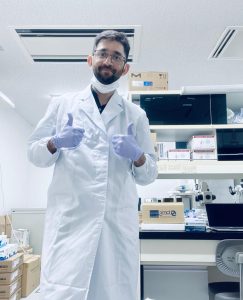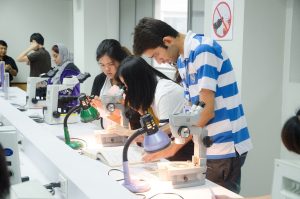We are celebrating the achievements of Malaria Consortium’s Dr Sylvia Meek scholars, who have benefited from a scholarship fund set up in 2016 to honour the legacy of one of our co-founders. Since the scholarships began, eight students have embarked on master’s programmes in Entomology at one of three universities: Mahidol University in Bangkok, Thailand; the University of Nigeria, Nsukka; and the University of Pretoria, South Africa.
In our fourth look at the achievements of the scholars, we spoke to Muhammad Adnan about his reflections on his studies at Mahidol University.

Since childhood, I have been fascinated by tiny creatures. I often asked myself and my siblings how these insects lived, reproduced and what type of functions they performed on earth. These questions triggered me to learn more about insects and I pursued a bachelor’s degree in Entomology from Gomal University, Dera Ismail Khan, Pakistan. During my bachelor’s, I was exposed to a variety of topics related to insects, such as morphology, beneficial insects, and insects of medical importance. I found myself leaning towards medical entomology, which focuses on the deadliest vectors that transmit various diseases in humans and animals.
I was astonished to learn about the devastation caused by pathogens, particularly viruses, transmitted by insects in my home country of Pakistan and across the world. I took a conscious decision to focus on the control of vectors of arboviruses, which evolved my understanding of the virus-vector interactions as a key to arbovirus control and prevention.
In this regard, I searched and targeted QS’s top-ranked universities that provided medical entomology degrees with financial support. I found that Malaria Consortium was offering a scholarship at Mahidol University for prospective medical entomology students. I was very excited by this, filled out all the appropriate paperwork and sent it to the institution right away.
At the time of my application, I was unsure if I would be successful because there were only a few seats available and students from throughout Asia were eligible. Days passed, then I received an email informing me that I had been chosen for the scholarship. I felt so honoured and prepared myself to begin a new journey at this most prestigious university within an exciting field!
In my life as a master’s student at Mahidol University, those around me, including wonderful supervisors and extremely supportive lab mates, became like family to me. Working in a department with coworkers that were both cooperative and diligent was a dream come true. For me, the Ratchaburi field trip was a once-in-a-lifetime opportunity. As theoretical information was insufficient to comprehend a critical scenario, I was also thrilled to acquire practical knowledge in how to protect populations in mosquito illness endemic areas, collect samples, identify bacteria and survey mosquito larvae.

The experienced university staff at Mahidol University made my experience thoroughly enjoyable and enlightening. The university provided me with access to all the facilities I needed to conduct cutting-edge research, including the latest simulation tools and laboratory facilities. Most significantly, it boasted a fantastic research environment that placed a strong emphasis on outcomes and publications which kept me motivated as a researcher. Regular seminars and lectures were held by the faculty to assist in the development of my abilities. I felt that my learning experience was so comprehensive because of Mahidol’s strong commitment to transdisciplinary research.
During my master’s degree, I defended my thesis on the title, Comparison of effective dose with deterrent time for three botanicals by using membrane-feeding system against Aedes aegypti. Through this project, I learnt about mosquito biology, repellent testing, mosquito artificial membrane, feeding and mosquito colony miniatures. This boosted my confidence in the sector. I dedicated my thesis to my beloved sister Poonam, whom I lost her during my master’s study.
I am grateful to Dr Sylvia Meek for helping me to realise my ambition not only financially but also in terms of advice. I want to express my gratitude to Malaria Consortium’s Technical Director, Dr James Tibenderana, and Senior Vector Control Specialist, Dr Leo Braack, who assisted me when I needed it most through my studies. I send them both my best regards.
